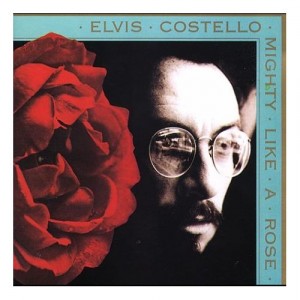
"Mighty Like A Rose" Was Elvis Costello's First Album Of The '90s. It Had A New Collaboration With Paul McCartney Named "So Like Candy".
I will never forget how much I resisted buying this album. The guys at the CD store had it for a long, long time. I was dead against getting my hands on another disc that had “Hurry Down Doomsday”. One copy of that song as part of the “Extreme Honey” compilation sufficed. Plus, the other songs I knew from “Mighty Like A Rose” clearly signaled that the CD stood as the highest peak within Elvis career as far as inventiveness that spilled into weirdness went.
Eventually, that was what made me shell out for the album. I just admire the man, and I had to see what did exactly happen for him to end up cutting a disc with a string quartet just two years later.
Funny enough, I did not get that answer. What I got was a CD that was (and still is) impenetrable. The level of musical chaos and the jumble of styles make for one of the most hostile records I have ever come across.
The production is certainly a major issue. Those who complain about the way Mitchell Froom produced Richard Thompson should give “Mighty Like A Rose” a spin in order to realize that they shouldn’t complain to begin with. But Elvis also had his own way behind the mixing board, so that he was as much of an instigator as anybody.
A sonic avalanche heralds the first cut, “The Other Side Of Summer”. Simply put, it sounds like The Beach Boys on every kind of substance you could ever imagine. Still, it is the one composition where an approach that is heavy-handed elsewhere works out. Whether that is because it is the first song out of the fourteen on offer and that it catches you while you are still fresh could be debated, though – when I listen to the song on “Extreme Honey” I am not that keen on it.
Where the approach does not work for sure is on “Hurry Down Doomsday” and “Invasion Hit Parade”. The production ends up conjuring an almighty racket bar none. And suddenly, when the din goes away you have something like the bare, Spanish-influenced “After The Fall” that sticks out like a sore thumb.
At any rate, the disc has the excellent “Harpies Bizarres”, a song driven along by a lush woodwind section and some of the most characteristic lyrics on the whole disc (“the waiting lines are long/they never go too far”).
Another (partially) approachable moment comes at the end, with a song penned by wife Cait O’Riordan. Named “Broken”, it is a vivid description of fatalism which is freed from the verbiage Elvis offers on his own songs. Again – whether the tune would work well in another context can only be speculated. Here, it lets you come down a little before the disc culminates with “Couldn’t Call It Unexpected No. 4”, a waltz that Costello has been known to play live just with his guitar – no microphone at all.
Incidentally, the disc also has two new McCartney compositions. They are quite accessible cuts too, but neither “So Like Candy” nor the retro-styled “Playboy To A Man” equal (or even remind us of) the hit from the previous record, “Veronica”.
The CD makes it blatantly clear that Elvis had no way to top himself any longer. Not commercially, that was never an issue. Rather, he did not know where to take his expressivity next. “The Juliet Letters” was to be the start of a rediscovery process that would lead him towards an artistic reignition.
Ultimately, “Mighty Like A Rose” stands as a reminder that forms can only contain so much. Nothing can be crammed beyond a certain point. Its density as an album is matchless. It also speaks about Costello’s ambition in terms of expressing ideas and concepts. The adjective in that case is also matchless. The thing is, we didn’t need an unlistenable album in order to know that. But I guess Elvis did, as an unequivocal reminder of where his art could start and end, and which (self-imposed) conventions he was to tear at next.
Rating: 5.5/10

Pingback: Southern Accents – Tom Petty (Album Review) (Part 2) | MusicKO